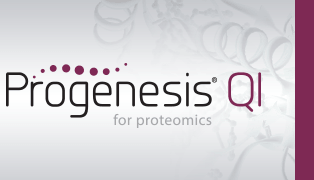What file formats, data types and instrument types are supported?
File formats
Progenesis QI for proteomics directly supports many of the most common data formats produced by LC-MS machines. It also offers an extension mechanism by which new formats can be supported (see the custom development section below).
The following list gives the various file formats currently supported, both those that are pre-packaged with the software and others that can be downloaded to extend your existing software:
| Data file format | Download the plugin |
|---|---|
| AB SCIEX (.wiff) | Provided as standard |
| Agilent (.d) This plugin is compatible only with version 2.0.5556 or greater of the software. Please read the plugin's FAQ page. |
 |
| Bruker Daltonics (.d) This plugin is compatible only with version 2.0.5556 or greater of the software. Please read the plugin's FAQ page. |
 |
| mzML files | Provided as standard |
| mzXML files | Provided as standard |
| NetCDF files | Provided as standard |
| Thermo (.raw) This plugin is compatible only with version 2.0.5556 or greater of the software. Please read the plugin's FAQ page. |
 |
| Waters (.raw) | Provided as standard |
Note: after installing any of the plugins above, you will need to restart Progenesis before they are available for use.
Currently, other formats should be converted to mzML or mzXml.
Custom development
We're happy to work with you to support other file formats you may prefer to use. If you're interested in this option, please email support_nld@waters.com and one of our development team will contact you to discuss your needs and how we might help.
Data type
Data may be in either Profile or Centroided forms although you will usually get the best results using profile data. Additionally, if you use centroided data you will be asked to enter the full width at half maximum (FWHM) resolution of the machine on which the data was collected.
Instrument types
Progenesis QI for proteomics works with a wide variety of machine types. For most instrument types the default peptide detection method in Progenesis QI for proteomics should be used. For low resolution ion trap instruments, the specialised low resolution detection method option in Progenesis QI for proteomics should be used. We have also included an option for optimum detection of runs from Thermo FT-ICR instruments, which typically has much lower levels of noise than data from other instrument types.





